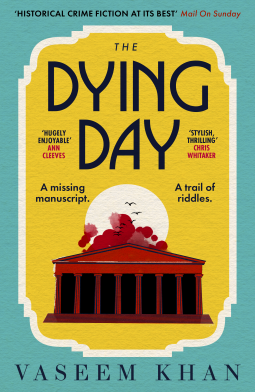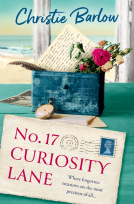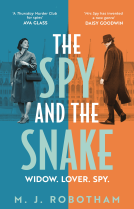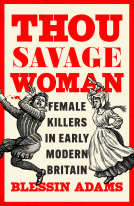
The Dying Day
The brilliant novel in the highly acclaimed Malabar House series featuring Persis Wadia, India's first female police detective
by Vaseem Khan
This title was previously available on NetGalley and is now archived.
Send NetGalley books directly to your Kindle or Kindle app
1
To read on a Kindle or Kindle app, please add kindle@netgalley.com as an approved email address to receive files in your Amazon account. Click here for step-by-step instructions.
2
Also find your Kindle email address within your Amazon account, and enter it here.
Pub Date 8 Jul 2021 | Archive Date 31 Aug 2021
Talking about this book? Use #TheDyingDay #NetGalley. More hashtag tips!
Description
'The Da Vinci Code meets post-Independence India. I'd be surprised if I read a better book this year' M. W. CRAVEN
'This is a crime novel for everyone; for those who love traditional mysteries there are clues, codes and ciphers, but it also had a harder edge and a post-war darkness. Brilliant' ANN CLEEVES
A priceless manuscript. A missing scholar. A trail of riddles.
For over a century, one of the world's great treasures, a six-hundred-year-old copy of Dante's The Divine Comedy, has been safely housed at Bombay's Asiatic Society. But when it vanishes, together with the man charged with its care, British scholar and war hero, John Healy, the case lands on Inspector Persis Wadia's desk.
Uncovering a series of complex riddles written in verse, Persis - together with English forensic scientist Archie Blackfinch - is soon on the trail. But then they discover the first body.
As the death toll mounts it becomes evident that someone else is also pursuing this priceless artefact and will stop at nothing to possess it . . .
Harking back to an era of darkness, this second thriller in the Malabar House series pits Persis, once again, against her peers, a changing India, and an evil of limitless intent.
Gripping, immersive, and full of Vaseem Khan's trademark wit, this is historical fiction at its finest.
'A delicious treat of a historical crime novel' OBSERVER
'Thoroughly enjoyable' DAILY MAIL
*** Book one in this series, Midnight at Malabar House, won the CWA Sapere Books Historical Dagger and is an international ebook bestseller. ***
'A wonderful, pacy, literary mystery with a brilliant female protagonist. Vaseem writes books that are good for the soul' STEVE CAVANAGH
'A hugely entertaining, devilishly clever and immersive murder mystery. Inspector Persis Wadia is a brilliant creation and The Dying Day is a triumph. This is my favourite new crime series, and I can't recommend it highly enough. Treat yourself!' ANTONIA HODGSON
'In The Dying Day, Vaseem Khan paints an extraordinarily vivid picture of a Bombay in 1950 still reeling from the aftermath of Partition and suffering the legacy of Empire. Every single element of this complex and compelling story slots together perfectly in the most brilliant and gripping of riddles ... A masterclass in historical crime fiction' CHRIS LLOYD
Available Editions
| EDITION | Other Format |
| ISBN | 9781529341065 |
| PRICE | £16.99 (GBP) |
| PAGES | 352 |
Average rating from 70 members
Featured Reviews
 Arunaa A, Reviewer
Arunaa A, Reviewer
"Dying Day" - Part 2 of the Malabar House series by Vaseem Khan.
5 🌟🌟🌟🌟🌟 read!
A clever treasure hunt with a trail of clues set in witty riddles and puzzles.
A murder, a suicide and a lost treasure. Hitler and Mussolini made cameo appearances. Quite the series of historical clad crimes in an entanglement (Vaseem's signature touch). But my girl Persis muscled through the maze, solved all 3 mysteries like a hat-trick.
Was so amused at the Freemasonry becaming a saving-grace in the discovery of the treasure!
I loved it! I love Vaseem Khan's stories. I love his style of writing. Indulged in a Persis story yet again. I am already waiting for his next book.
Thank you so much, @hodderbooks for gifting this Advanced Reader's Copy. I was thrilled to receive Vaseem Khan's new murder mystery before the release date. You made my day.
Thank you @netgalley for making this happen!
#TheDyingDay #hodderandstoughton #hodder #hodderbooks #netgalley #arc #netgalleyreads #netgalleyreview #vaseemkhan #themalabarhouseseries #themalabarhouse #midnightatmalabarhouse #advancedreaderscopy #igreads #bookstagram #bookstagrammers #bibliophile
 jean luc e, Librarian
jean luc e, Librarian
Persis Wadia, India's first female police detective is back in this brilliantly plotted and highly entertaining murder mystery set in 1950 Mumbai, the second installment in Vaseem Khan's Malabar House Mysteries. When a rare and priceless edition of Dante's Divine Comedy mysteriously disappears from The Bombay Branch of the Royaĺ Asiatic Society, Persia finds herself leading an investigation at the centre of a vast and sinister intellectual puzzle involving a slew of literary riddles, a growing number of unexplained murders and some dangerous war criminals on the lam....
With its fiendishly written plot full of menaces, delicious humor, terrific dialogues and unforgettable characters, this elegant and old fashioned whodunit redolent with the smells and sounds of a recently independent India should definitely keep readers guessing and on the edge of their seat from start to finish. To be enjoyed without any moderation!
Many thanks to Netgalley and Hodder & Stoughton for the opportunity to get this ARC before its release date
 Book B, Reviewer
Book B, Reviewer
Mr Khan, thank you.
I love treasure hunts. I love books. I love treasure hunts and books and literary clues to a literary treasure and mystery. This is a mystery which starts with the loss of a manuscript = Dante's Divine Comedy from a society in Bombay. There is a trail of clues and the reasons behind the disappearance ,the how and the why it was taken was a delight to find out. I do love a mystery and when it concerns real life literary facts (much of the book is based on or inspired by real facts and events) then this is music to my ears!
 George S, Media/Journalist
George S, Media/Journalist
Fascinating mystery set in post-war Bombay replete with secret codes, multiple murders snd many twists. The detective is the first woman police inspector snd she displays a fierce independence. Well written, the book concludes on a slightly disappointing nite, but up to then it was a compelling read.
The second book in this series does not disappoint. Again we meet Persis, the only female detective in India and the adventure begins anew. The character of Persis and the satellite characters around her are becoming more fleshed out and we see a bit more of her personal life here in this book. Set in post colonial India this is a series which I really hope develops. Khan writes so well, you can see and feel the city and the people so clearly. This mystery surrounds Dantes seminal work and I found myself wanting to know more, I enjoyed the story thoroughly and wouldhighly recommend it. My grateful thanks to Netgalley and the publishers for allowing me an ARC but especially the author for an entertaining, exciting and brilliant read
 Reviewer 266180
Reviewer 266180
Ingenious, Delightful And Elegant....
Ingenious, delightful and elegant mystery from the very talented pen of Vaseem Khan. A priceless, literary manuscript vanishes and the case lands upon the desk of Persis Wadia. The trail of clues begins. Steeped in rich historical detail, wonderfully drawn characters, an intricate and cleverly compiled plot and much wry humour this is simply a joy. It really doesn’t get much better.
 Tracey L, Reviewer
Tracey L, Reviewer
I read and thoroughly enjoyed the first book in this series, and I really enjoy Vaseem Khan’s writing, so I was delighted to receive a copy of the second book in the Persis Wadia series. I wasn’t disappointed, it is a fantastic book.
There is a fantastic sense of place, Khan’s writing really does appeal to the readers’ senses and invokes the sights, sounds, and smells of post-war, post-independence, post-partition India and I love that aspect of the novels. Also, as a quite voracious reader, it makes me very happy that Persis’ father runs a bookshop, which Persis uses like a reference library, to help her solve elements of the cases she works on.
I am fully invested in the lives of the characters, even those that are quite unlikeable, but I love Persis and I am quite desperate for her and Archie to get together. I also love her father and her aunt, who really makes me laugh with her constant attempts at matchmaking. This time we meet other characters from Persis life, including the man who broke her heart.
The case/s that Persis has to solve are well thought through, intriguing and I really could not put the book down. It really is a page turner!
I really love this series, the setting is fabulous, the cases the team at Malaga’s House have to solve are really interesting, the political interference adds a further dimension and the characters, particularly Persis and Archie are wonderful. Moreover, it is great to read a series that gives a voice to woman in a very male dominated world. I cannot wait for the third instalment.
Thank you to Hodder & Stoughton and Netgalley for an ARC, in return for a honest review.
My thanks to NetGalley and Hodder for this ARC in exchange for an honest review.
An intelligent, clever novel, beautifully written, full of the essence of post partition India and laden with background history and theology.
Vaseem Khan has referenced many book titles and authors in Persis’ search to unravel the cryptic riddles in this book, bringing authenticity to the story. It was difficult not to get sidetracked to check each of these novels, which will encourage further reading.
A brilliant and totally absorbing book. Thank you Vaseem Khan.
 Jane A, Educator
Jane A, Educator
Having read and having thoroughly enjoyed Midnight at Malabar House, I was excited to read the next in the series about Persis Wadia, the first female detective in India. The book takes place in the early 1950s, three years after partition, and for any reader who wants to know more about this period in Indian history, this is a first-class mystery full of rich historical detail. The story centers around the thievery of the 600 year-old manuscript of The Divine Comedy from the Bombay Asiatic Society and the death of the Englishman who must have taken it. Vaseem Khan spins a sophisticated and gripping tale full of riddles and coded clues that keeps the reader mystified and curious as Persis unfolds the mystery of what really happened. To add to the detail and mystery of this situation, there are more murders connected to the manuscript, Mussolini plays a part, and the suspected thief has a connection to the Nazis that is revealed as the plot thickens. This book is compelling and clever and is highly recommended for all lovers of mysteries.
 Rony C, Reviewer
Rony C, Reviewer
What a glorious read! May Persis Wadia share many more cases with us.
Inspector Persis Wadia, the first woman inspector for the Indian Police is called to the Bombay Branch of the Royal Asiatic Society of Great Britain and Ireland when a priceless copy of Dante Alighieri’s La Divina Commedia - The Divine Comedy dating back to the fourteenth century disappears along with John Healy, one of the world’s foremost Dante scholars (employed by the Society as the Curator of Manuscripts). Wadia is left with nothing but riddles to track down, not just the book but also John Healy.
At the same time, the body of a foreign white woman has been found next to a railway line. Can this be connected to the missing book?
Vaseem Khan is a brilliant author. I first discovered his writing through the Baby Ganesh Agency series featuring Inspector Chopra. This is the second book featuring Persis Wadia. A “no-nonsense” female detective whose father owns a bookshop, filled with books covering every subject from very old to modern. We get to know this bookshop thanks to Persis having to search through literature to find the clues Healy has left behind.
There’s a gentle side to Persis, which is very seldom on show, especially in front of her fellow officers, simply because they’d walk all over her – women in India in the 1950s were not supposed to have reached positions like police inspectors – not just because men viewed them as inferior beings but also people like her aunt, who advocates that all women should be married – not running around in a uniform carrying a gun. However, now, and then, Persis will get dressed up in one of the fine garments that her aunt has purchased for her, and this is when we see the truly beautiful feminine side of her.
This novel is so much more than simply the search for a priceless book. It is filled with riddles and history and just some of the most awesome characters I’ve ever encountered in a storyline.
Rony
Elite Reviewing Group received a copy of the book to review.
 Emma B, Reviewer
Emma B, Reviewer
This was a gripping, intelligent mystery, even better than the first accomplished work of the series. In this book, Persia truly shines as an exceptional detective, refusing to be cowed by the misogyny and male dominant culture around her. It was also fascinating to read about WWII from an Indian perspective. And now the long wait until the next one….many thanks to Netgalley for an arc of this book.
 Librarian 431790
Librarian 431790
It's great to be back to Malabar House and read another Persis Wadia's investigation.
It's a multilayered, complex and fascinating story that mixes historical facts and fiction. An excellent depiction of Indian society after the independence and the struggle of a woman to manage her own life.
The plot is gripping, fast paced and full of twists. It kept me turning pages and guessing till the end.
The characters are fleshed out, Persis is a strong woman and I like how she relates to her contemporary society and what a woman is expected to be.
The historical background is vivid and well researched.
It's a great story that i strongly recommend.
Many thanks to the publisher and Netgalley for this ARC, all opinions are mine
When the first book in this series came out, I was happy for a new book from Mr. Khan, but upset that he was not currently writing a new "Inspector Chopra" book. And then I read it and all was forgiven. With this second installment in the "Malabar House" series, my admiration for Mr. Khan and his writing just continues to grow, as well as my love for Persis Wadia and all things India.
It is rare for me to develop book crushes - I have never been one to swoon over Mr. Darcy [though the actors that play him are a completely different story! ;-) ] or anyone like that, so if I develop a real affection for a character, it means that they have to be extremely well-written. This is where I am with Persis Wadia. She is absolutely amazing. Even when she is frustrating [going alone to the astronomy tower at night Persis? R E A L L Y??? Sigh], she is amazing. Her non-existent people skills is something I strive for [someday I will be able to say exactly what I feel and not worry what people will think of me and then walk away from it as well], and I love how she fights for herself in every way she knows how, even when she is fighting Aunt Nussy [who is formidable in her own right and who Persis is more like than she's like to admit, just in a way different way] and her campaign of making a "girl" out of Persis. She is also a top-notch Inspector/investigator, with the kind of analytical mind that every mystery loving person both loves and wishes they had. She is close to being the perfect character, which is really rare. Well done Mr. Khan.
The only negative for me with this book [aside from my continuing learning about India and Partition and wishing I knew more] was that is was centered around Dante's Inferno and I have not yet read that and I spent quite a bit of time going "what? WHAT does that even mean" [though I admit it has made me even more intrigued about it and I know that I will have to read it in the next year or so] all while being intrigued by the poetry of Inferno and how it was used to lead Persis and her team on an extremely extravagant treasure hunt, which led to a very clever reveal and ending. And while I guessed several things much earlier than Persis did, I didn't know the why or where and even the knowing didn't take away from the amazingness of this book and the end was very well done - and hopefully leaves it open for more books. Because I will not be a happy camper if Persis is regulated to just two books; she deserves so many more.
Thank you to NetGalley, Vaseem Khan, and Hodder and Stoughton [UK] for providing this ARC in exchange for an honest review.
“The Dying Day” is my introduction to Vaseem Khan and I am so grateful to make his acquaintance! What a fabulous mystery! It has everything one wants in a good whodunit and more!
The setting is India in 1950 and our leading lady, Persis, is the first female inspector. She is set a “peripheral” case which grows and become entangled with so much more. The complexity of post-colonial Bombay and its rich history is deftly handled.
Each character is multifaceted and beautifully written. The story is immersive and fast-paced, once begun it’s very tricky to put down! I loved it all!
If you enjoy a good historical novel, don’t miss this one! I’ll be enjoying many more from Vaseem I’m sure! And my first stop will be the first of this series, not necessary to appreciate this one but I’m sure I’m going to be captivated by it! It’s a five out of five on the enJOYment scale.
I received a complimentary copy of the book from Hodder & Stoughton through NetGalley. The opinions expressed in this review are completely my own.
 Jackie H, Reviewer
Jackie H, Reviewer
The Dying Day by Vaseem Khan is the second book featuring Persis Wadia and although I haven’t read the first book, thankfully it didn’t really matter.
In short, Persis, the only female police inspector based in Bombay in the 1950’s, finds herself deep in a double investigation, Dante’s 600 year old missing manuscript and a dead woman…could there be a connection? It’s a clever mystery filled with curious riddles, codes and ciphers and flooded with historical facts, which make this such an interesting read.
Vaseem is a great storyteller, alongside the drama, in Persis he has captured a strong, modern Indian woman living in challenging times during India’s post partition…the sense of place just leaps off the page. It’s an absolute belter of a thriller and I’m hoping there will be more from Persis and her team soon.
Big thanks to Vaseem Khan, Hodder & Stoughton and NetGalley for this eARC which I chose to read in return for my honest review.
The Dying Day is the second instalment in the terrific Malabar House series, and this time it centres around a murdered man and bespoke treasure, and Persis must solve the riddle to find the killer - or die trying. Bombay, 1950 and India's first female police detective, Persis Wadia, is summoned to the 150-year-old Bombay Royal Asiatic Society at Horniman Circle. The society's preeminent treasure, a priceless manuscript of Dante's Divine Comedy, has vanished, as has the society's head curator, William Huxley, an Englishman with a passion for Indian history. Tasked to recover an item for which Benito Mussolini once offered one million pounds, Persis soon uncovers a series of murders and a trail of tantalising coded clues that lead her into the dark heart of a conspiracy.
This is a scintillating, superb and compulsive mix of luscious historical fiction and absorbing mystery. Khan has a vast historical knowledge of India which comes to the fore throughout and it's clear the country is still feeling the effects of World War II. His extensive knowledge brings both the time and place vividly to life by touching on culture, religion and the food as well as traditions and customs consistent with the time period. You can almost smell the spices. Some of the views of the time are shown through our protagonist’s struggles in a male-dominated workplace which fostered a culture of misogyny, condescension and entitlement, and Persis must work twice as hard as the men to prove her worth. This is a compelling, engrossing and richly atmospheric historical mystery. Highly recommended.
 Michaela J, Reviewer
Michaela J, Reviewer
I'm coming into this series a little late and still need to read the first book.....however, I didn't feel that I missed out on vital information reading this and thoroughly enjoyed this tale. I couldn't put it down.
The story centres around the disappearance of an English scholar who is working on a new translation of Dante's The Divine Comedy. Not only has he disappeared, but the manuscript has disappeared with him and a copy of the Bible left in it's place. Persis Wadia is tasked with finding both the scholar and the manuscript as soon as possible as it is a politically sensitive item.
Meanwhile, the body of a white woman is found down on the railway tracks and she is asked to supervise the investigation into that being led by Fernandes, someone who has betrayed her in the past.
As the story progresses, Persis has to solve puzzles to proceed with her case and the re-emergence of a face from her past throws her off kilter.
I loved this story and find the historical slant extremely interesting. I will read the previous book as soon as I can.
 Mallika R, Reviewer
Mallika R, Reviewer
My thanks to Hodder and Stoughton and NetGalley for a review copy of this book.
Second in the Malabar Hall series by the author, The Dying Day is a historical mystery featuring the (fictional) first female police inspector in India Persis Wadia. Set in 1950s Bombay, we find ourselves at a time when the country is still finding its feet, there is some amount of disillusionment and also the shadows of the unspeakable violence and death that marked the partition.
Persis is asked to take up an investigation at the Asiatic Society but other than being told that there’s a missing manuscript, she hasn’t been given details. Arriving there she finds it isn’t just a rare manuscript but an over six-hundred-year-old copy of Dante’s Divine Comedy, one of the two oldest in the world. Not only that, the curator in-charge John Healy, a renowned scholar working on a translation of the MS has gone missing as well. But why would someone that well known steal the manuscript? The matter is of course not as simple as it seems on the surface, and soon Persis finds herself faced with a series of riddles and ciphers which she must solve to reach the manuscript. The pressure is immense as the matter can lead to a politically charged situation if not resolved soon. Alongside, the body of a white woman is found on the railway tracks and a forensic examination reveals that this was not a suicide but murder. Persis’ nemesis of sorts, George Fernandes is asked to lead the investigation while Persis is simply to supervise but this leads to some tensions for Fernandes had leaked information to the press in a past investigation showing her in poor light.
Alongside Persis has to also cope with the attention she attracts due to her position as the first woman inspector as also the mistrust and disapproval. There are also troubles in her personal life as she finds she has feelings for forensic investigator Archie Blackfinch (whom her family would never approve of) while her old love interest Zubin Dalal (who had betrayed her, and married another woman) is back in the picture.
This was a really interesting mystery which had so many elements that I enjoy, and kept me engrossed throughout.
For starters, I should say that even though this was a second in series, I found I didn’t have any problems getting into the story as the author has included sufficient recaps and background (I mean the basics of Persis’ story and the threads that continue across the books) for one to be able to grasp things and follow along.
When I had requested the book, I had done so on the basis that it was a historical mystery set around the first woman inspector but I don’t think I had taken in what the mystery was about so that actually turned out to be a really pleasant surprise when I started. For, a mystery with a missing ancient manuscript, and a set of riddles and codes to solve to get to it is something right up my alley and I absolutely loved it. I didn’t make any attempts to solve the riddles (though I doubt I would have gotten far not knowing Bombay so well), but thoroughly enjoyed watching Persis work them out. An added bonus for me was that since Persis’ father Sam runs a book shop, we have literary references and allusions throughout and she also solves many of the questions in her mind through the books she has come across in the shop or by looking things up.
I also really liked that the basic background and many of the elements that the mystery was based around including the Dante manuscript and Bombay’s architecture are real. I think one more familiar with Bombay (or Mumbai as it now is) would enjoy it all the more for the places referenced would be a great deal more fun for them. Other than Bombay and its history, the events of World War II also impact the mystery for the curator Healy had been a prisoner of war, and another character is also haunted by their experiences.
Persis herself I found slightly hard to like although I could understand her reasons for being as she is. She joined the police in a sense because she was told she couldn’t but now she simply wants to do her job and not be the centre of attention in any way, yet she finds herself being treated as some sort of exhibit or zoo-animal which while not surprising, makes her prickly and short with people.
That small complaint apart, I found the book to be far more interesting (and even more meaty) than I had expected and enjoyed it thoroughly.
[The other small niggle was I was unsure about was how Persis was an inspector since as far as I know IPS officers start out at a higher rank.]
A thoroughly enjoyable second outing for Inspector Persis Wadia, the first Indian woman police detective in 1950s post-partition Bombay. There’s a priceless missing manuscript, a treasure hunt of clues, mysterious dead bodies and dastardly Nazis - an absolute page-turner! We get to know Persis better in this book and she’s a great character. I’d really love her to be happy in love, but settling down and becoming a housewife really wouldn’t suit her personality.
Five stars and I’m already looking forward to Book Three.
Thanks to the author, publisher and NetGalley for providing a review copy in exchange for honest feedback.
 Mystica V, Reviewer
Mystica V, Reviewer
Another book by this brilliant author which takes us into the world of post British India. Persis Wadia is the only woman Police Inspector in India
and boy has she got to face discrimination, snide remarks, looks and worse. Persis a Parsee (a small forward thinking minority community) has the support of
her father but her Aunt who has looked after her since the death of her mother finds it tough to accept Persis's role in the masculine world she occupies.
On the one hand Persis herself knows that she is going to find it singularly difficult to find a partner. But at the same time, her career is important
to her and she is not going to allow anything to get in her way.
The case of a missing book worth millions starts the case going, with the main protagonist going missing. He is an erudite scholar and it is only through
the sheer brilliant workings of Persis's mind that she unravels the cryptic clues he leaves behind. A mix of detection and knowledge of the classics slowly
unwinds the puzzle, and with the murder of a white woman (uncommon in post British India) the pressure is on to solve the case.
When Italian diplomats also get involved in the case, it is obvious that big money is also somehow involved and it is a running battle for Persis with the
reluctant help of her colleagues to prevent more murders and find out who is behind the robbery.
A fascinating look at colonial India (post Colonial actually) with all the workings and administration as it were before.
I loved this story (my second read of Persis's exploits). With all the inhibitions and difficulties of 1950s India.
 Hilary W, Reviewer
Hilary W, Reviewer
In this latest novel by Khan we see police inspector Persis return for her second literary outing a short seven months after her first appearance. She still lives at home with her father (above his book shop) her Auntie has not given up the idea that as a 27 year old she really needs to get married (thus ending her career). She also continues to work in the same, maverick, police office in Malabar House with her previous team of misfits and disgruntled. They are still passed all the politically sensitive, or otherwise, difficult cases in Delhi rejected by the more powerful. So Persis is asked to head up an investigation into the theft of an early copy of Dante’s Divine Comedy from the library of the British Asiatic Society.
“Just a book” it certainly is not. As one of the two earliest copies of this medieval treasure in the world it is much desired. Stories that Mussolini offered to buy it from the Society in the 1930s for a prodigious amount of money, have been followed by political requests from the Italian Government for its return. Unfortunately it appears that not only has the book been removed, but the Society’s curator of manuscripts John Healy has also disappeared. Under investigation by Persis it will become clear that he has left a trail of literary clues to its new hiding place. In the meantime another problem has surfaced, an unidentified white woman has been found dead on a railway line. In a personnel turf war Persis will be allocated oversight role of the investigation to be carried out by one of her colleagues she has been in dispute with. Not a happy situation. Ultimately the two crimes will merge.
It needs to be said as well that the Dante is highly desirable and a number of potential “owners” with dubious ethics (to put it mildly) will start to emerge. So the investigation will involve Persis moving through this shifting mass of characters who are not quite what they present themselves as. Just as she has to deal with evolving post partition politics and problems she now has to cope to with people’s back histories during the Second World War too. So this is the opportunity to muse on the fallout of war and the ongoing damage it can cause, but also perhaps on the morality of ownership of lands and antiquities into the longer term. Much of the collections of the British Asiatic Society are of course the relics of the heritage of the British East India Company.
But Persis has to follow the clues to find the book. These are literary in nature and they take readers through the historic buildings and landscapes of Delhi and its surrounds. The buildings were by this time becoming increasingly obsolete and even going out of use. But this part of the book is a wonderful and informed travelogue on the nature of the buildings of Empire and through them its rule. But crime has a tendency to turn to violence and men who have been through the war might have learnt some not so peaceful - possibly extremely violent – habits. These will emerge and Persis will have to work her way through these threats with surprisingly little professional support (and a great deal of luck).
This is crime fiction and so requires a certain degree of reader suspension of disbelief. But it is added to Persis and her friends, family and colleagues all starting to emerge as more solid and rounded characters here. But the real winner in this novel is of course the City of Delhi. That is the most wonderful and engaging aspect of this book. Does this novel appeal as much as the first? It might be said that is over-complicated, with too many sub-plot lines, some of which are developed in such detail as to maybe unbalance the book. But is it overall a “good read”, I think most readers of crime fiction that relies on character and place rather than gore would say yes.
 Pat R, Librarian
Pat R, Librarian
This is the second book to feature Persis, the (fictional) first female police detective in Bombay.
I really like the character - her challenges and her ambitions are much clearer in this book.
The mystery involves a priceless missing manuscript, WWII spies, and a wonderful look at life in Bombay just after Indian independence.
She continues to be confused by her attraction to an Englishman, and complications arise when her former fiancé, who ran off to marry someone else, resurfaces. Her family's constant nagging is quite amusing as well.
This is a very good read, well written, and fast-paced.
Recommend for fans of Abir Mukherjee and Kwei Quartey.
This is the second in Vaseem Khan’s Malabar House series, which follows Persis, India’s first female detective, shortly after partition.
A priceless copy of Dante’s Divine Comedy has gone missing from Bombay’s Asiatic Society, along with the man who was studying it. The case lands on Persis desk and pulls her into a clever thriller replete with riddles, cyphers, intricate plot and some very bad people (I don’t want to give too much away). It’s an absolute rollercoaster of a ride and fantastic from start to finish.
This is a very welcome return for all of the characters who had their first outing in Midnight at Malabar House. Both are excellent stand alones but it is worth getting a true feel for the people and the historical significance of Persis which is more prominent in the first book. The Dying Day is a step up with regards to plot and pace. I hugely enjoyed it.
Thanks to Hodder and Netgalley for an ARC.
 Paromjit H, Reviewer
Paromjit H, Reviewer
This is the second in Vaseem Khan's historical Malabar House crime fiction series, set in India in 1950, featuring the now famous ambitious Parsee Inspector Persis Wadia, India's first female police officer. Her fame has grown at a national level after events from the previous book, putting her under an uncomfortable spotlight, pushing her as a role model she is not keen to be, whilst at the same time derided for doing what is perceived as a man's job. She would rather just get on with her job which is her sole focus, she is not always a likeable personality, she is socially awkward, charmless, stubborn, feeling she has to constantly prove herself, and not at ease when it comes to her personal life, particularly as she had been betrayed the one time she had been in love. She is shying away from acknowledging the feelings she has for Archie Blackfinch, the English forensic scientist she works with, facing warnings from her family about becoming involved with a white British man, particularly given her high profile position. After WW2, India has undergone the horrors of partition that followed independence from Britain.
At the Bombay Royal Asiatic Society at Horniman Circle, a priceless copy of Dante's Divine Comedy has gone missing, assumed to be stolen by their celebrated British Curator of Manuscripts who has gone missing at the same time, John Healy, a survivor from a prisoner of war camp in WW2, a traumatic experience that left him a changed man. There are political implications, putting Wadia under pressure to find Healy and recover the valuable manuscript for which Mussolini had offered £1 million pounds but had been rebuffed. She finds herself following a trail of cryptic clues and riddles left behind by Healy, leading to the manuscript, which seems strange given that he had taken it. She has a second case, her boss, Roshan Seth has appointed George Fernandes, who she is still furious with after he had betrayed her, leading to a fraught and awkward joint investigation of a murdered white woman left on the tracks.
Khan evokes a post-war India that is finding its feet, reconfiguring a new relationship with a Britain who is in the throes of losing its empire. His research of this period is impeccable, making this fascinating and colourful period of history come vibrantly alive, the mix of cultures and religion, along with the social norms and attitudes of the time. His central protagonist, the flawed and prickly Persis Wadia, feels like an authentic creation, having to constantly battle misogyny and a male world that would diminish and make invisible her achievements, she is a loner, much like Healy, whose past is slowly revealed in the book. This is turning out to be a wonderfully engaging and atmospheric historical series that I strongly recommend to both historical fiction fans and crime and mystery readers. Many thanks to the publisher for an ARC.
As usual in my reviews I will not spoil the book by rehashing the plot (there are plenty of reviews like that out there already!) Instead, I recommend that you read it for yourself!
This is the sequel to Vaseem Khan's earlier novel "Midnight at Malabar House", which I enjoyed, so I was delighted to be invited to read this novel.
Persis Wadia is once again the main character. She's a strong and headstrong character who doesn't help her own case by some of her behaviour, but given that - as India's first female detective - she faces hostility (both overt and hidden) from many sides, some of it is understandable! It was good to learn more about her background, and her attitude to relationships is more understandable given her past. I found her character more likeable in this novel (in spite of her rudeness, which I now feel is a form of self defence), and was also pleased to see more of Archie Blackfinch.
I really enjoyed this book - there are multiple mysteries, murders, a suicide (that may not be all it seems), plenty of authentic-sounding historical detail, and an interesting cast of new characters as well as those we've met before. Once again, there is plenty of detailed description, so that you can easily picture the settings and characters.
Looking forward to the next in the series - and am also hoping to read some of Vaseem Khan's other "Baby Ganesh" series.
My thanks to NetGalley and the publishers for an ARC. All opinions my own.
 Jen L, Reviewer
Jen L, Reviewer
Okay. Let me just put this out there - I really loved this book. Why am I saying this so plainly? Well, because I'm not really sure how to review the book and do it justice without risking some spoilers. This is a very clever, puzzling, historical mystery, with brilliant characters, a lot of suspense and a lot of tragedy, wrapped up in a story that touches upon a part of history that will remain memorable for all of the wrong reasons.
At the heart of the story we have the mystery of the missing manuscript - an ancient and priceless copy of Dante's The Divine Comedy. No only has the book disappeared, but so has the reputed scholar who was working on it. The simple answer is the most obvious - the scholar, one John Healy, took the book. If that is the case then why would he be leaving a series of clues that appear to be leading police directly back to the missing tome? That is exactly what Inspector Persis Wadia needs to work out in a hunt for a book that turns more dangerous with every new clue.
I loved the blend of mystery and police investigation in this book. Not only do we have Persis and the team trying desperately to find the book to stave off some kind of diplomatic incident between India and the Italian Government, but we also have the increasingly cryptic clues left by Healy. A mystery within a mystery. Add to this a separate murder investigation and the pressure is certainly on the team. It's not helped by the fact that as India's first female Inspector, Persis faces an uphill battle in gaining the respect and support of her team. It's a very believable dynamic,one which helps to shape Persis's character as every interaction seems like a very personal battle, another moment where she needs to prove her worth.
I do love Persis Wadia as a character. She is someone I can actually identify with. Not the same circumstances at all, and I faced far less resistance, but I had the dubious honour of being the first woman appointed to a Managerial operational role in a previous company. It's that need to be taken seriously, to prove yourself every bit as worthy as the male counterparts, whilst not wanting to accept concessions or seen as a role model just because of being female that certainly rings true. It makes for a real point of conflict with her colleague Archie Blackfinch too. That, and his simply being British, makes the clear chemistry between the two fun to watch but difficult for them to navigate. They are such opposites - Persis so serious whilst Archie is far more laid back, almost clumsy in his manner, but they make a perfect pair and I love reading about them.
There is a really serious side to this book, taking us back into Healy's past and a dark part of history. I really enjoy the way the author brings history to life within the books without overloading the reader with detail. The darkness, the atrocities are clear, the detail enough to give the story context but leaving scope for readers to go and do their own further reading should they desire. Not that this particular part of history is ever far from our minds. The narrative is pitched perfectly, the description of the history and of the setting, putting readers front and centre in the story, even when it is not necessarily comfortable to be there. Through the depiction of the surroundings and the characters, the author really brings India, and beyond, to life.
With so many people determined to get their hands on The Divine Comedies, there are no end of suspects, and Vaseem Khan skilfully lays out all the motivations whilst leaving the real danger hidden in plain sight. There is a sense of jeopardy, especially for Persis, and as the full truth is unveiled, you realise just how deadly it could all get. The suspense is maintained until the last and I was completely engaged in the story to the very last, defiant page.
Loved it. Please tell me we are getting a book three?
This was such a delightful mystery. Set in India shortly after independence, and with a protagonist who’s the first woman detective in India, there’s a ton of stuff going on even before you get to the mystery. Vaseem Khan handles the character of Persis, the protagonist, really well, and it’s hard not to like and respect her. The mystery itself, being centred around a series of riddles, was a little different from a lot of mystery plots and I enjoyed it very much. I didn’t guess what was going on, but I pretty much never do so that’s not saying much. I did find that I completely trusted Persis to get to the bottom of things, though, and I had a great time watching her do it. I definitely want to read more of these books!
Thanks to Netgalley for the ARC.
 Elaine T, Reviewer
Elaine T, Reviewer
I would like to thank Netgalley and Hodder & Stoughton for an advance copy of The Dying Day, the second novel set in 1950 to feature Inspector Persis Wadia, the first female officer in the Bombay Police.
Persis is called in when the Asiatic Society discovers that a priceless 600 year old copy of Dante’s Divine Comedy is missing, along with its curator, renowned academic John Healy. Uncovering a trail of cryptic clues Persis is soon on the hunt, but it gets more complicated with a series of murders.
I thoroughly enjoyed The Dying Day, which has a plot much broader in scope than I imagined from the blurb, and, more importantly, an excellent style that lured me in from page one and never let go.
The novel is told entirely from Persia’s point of view so the reader gets to live the events with her. Obviously as the first woman in the police service she is viewed as a trailblazer, but she sees herself as more stubborn, not so concerned with women’s rights as proving her naysayers wrong. She is an unlikely heroine, but actions prove louder than words as she attacks and solves her cases. Her voice is strong, not just in her ability to solve cases, but in her doubts, fears and dithering over her love life. In short she’s wonderful.
The plot is really interesting. What an imagination the author has to marry a complicated plot to historical fact and characters seamlessly and at the same time bring Bombay to life. I love all the snippets of fact he includes and yet I didn’t recognise the real life characters incorporated into the novel. The author has an engaging style of writing, so I never wanted to put the book down. The language is easy to read but not simple, seems vivid and there is some sly humour to further engage the reader. The plot has reveals on a regular basis, spurring the curiosity, and the turns it takes when broadening out are eye popping, but not fantastical or unbelievable given the setting and timeframe. I think it’s a tour de force that gets everything right.
The Dying Day is a good read that I have no hesitation in recommending.
 Annie G, Reviewer
Annie G, Reviewer
This is definitely trickier and more complex than the first book! Riddles galore in this, none of which I am clever enough to unravel. But, no matter - Inspector Persis Wadia is relentless and clever and soon begins to unpick the trail that has been left behind by William Huxley, the Bombay Royal Asiatic Society's head curator who has stolen the Society's priceless copy of Dante's 'Divine Comedy'. Finding his body on the top of a sarcophagus, however, throws Persis for a bit of a loop. Why would he leave clues behind that would lead to a dead-end (so to speak)?
All is not as it seems, however, and Persis is relentless. Along with resolving the theft that she has been tasked with, there is the relationship question mark hanging over her and Archie Blackfish. I'd like to see her throw some caution to the wind, but religious, societal, and broken heart strictures are hard to overcome.
Vaseem Khan is one of my favourite authors these days so it goes without saying that I will definitely be keeping this series at the top of my TBR pile.
Readers who liked this book also liked:
Robert Thorogood
General Fiction (Adult), Mystery & Thrillers, Women's Fiction
Rick Riordan; Mark Oshiro
Children's Fiction, LGBTQIA, Teens & YA


















